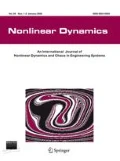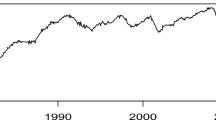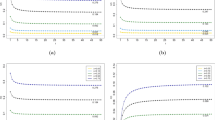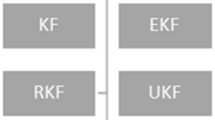Abstract
For the difficulty that the information vector in the identification model contains the unknown variables, we substitute these unknown variables with the outputs of the auxiliary model and then develop an auxiliary model based recursive least squares algorithm, an auxiliary model based least squares iterative (AM-LSI) algorithm, and derive an equivalent matrix decomposition based AM-LSI algorithm for input nonlinear controlled autoregressive systems based on the auxiliary model. The simulation results show that the proposed algorithms can estimate the parameters of a class of input nonlinear systems.


Similar content being viewed by others
References
Ding, F.: System Identification—New Theory and Methods. Science Press, Beijing (2013)
Ding, F., Gu, Y.: Performance analysis of the auxiliary model based least squares identification algorithm for one-step state delay systems. Int. J. Comput. Math. 89(15), 2019–2028 (2012)
Ding, F., Gu, Y.: Performance analysis of the auxiliary model-based stochastic gradient parameter estimation algorithm for state space systems with one-step state delay. Circuits Syst. Signal Process. 32(2), 585–599 (2013)
Wang, D.Q., Ding, F.: Least squares based and gradient based iterative identification for Wiener nonlinear systems. Signal Process. 91(5), 1182–1189 (2011)
Wang, D.Q., Ding, F.: Hierarchical least squares estimation algorithm for Hammerstein–Wiener systems. IEEE Signal Process. Lett. 19(12), 825–828 (2012)
Wang, D.Q., Ding, F., Chu, Y.Y.: Data filtering based recursive least squares algorithm for Hammerstein systems using the key-term separation principle. Inf. Sci. 222, 203–212 (2013)
Qin, P., Nishii, R., Yang, Z.J.: Selection of NARX models estimated using weighted least squares method via GIC-based method and l(1)-norm regularization methods. Nonlinear Dyn. 70(3), 1831–1846 (2012)
Hu, P.P., Ding, F.: Multistage least squares based iterative estimation for feedback nonlinear systems with moving average noises using the hierarchical identification principle. Nonlinear Dyn. 73(1–2), 583–592 (2013)
Chen, J., Zhang, Y., Ding, R.F.: Gradient-based parameter estimation for input nonlinear systems with ARMA noises based on the auxiliary model. Nonlinear Dyn. 72(4), 865–871 (2013)
Wang, Z.Y., Shen, Y.X., Ji, Z.C., Ding, R.: Filtering based recursive least squares algorithm for Hammerstein FIR-MA systems. Nonlinear Dyn. 73(1–2), 1045–1054 (2013)
Ding, F., Liu, G., Liu, X.P.: Parameter estimation with scarce measurements. Automatica 47(8), 1646–1655 (2011)
Ding, F., Shi, Y., Chen, T.: Auxiliary model-based least-squares identification methods for Hammerstein output-error systems. Syst. Control Lett. 56(5), 373–380 (2007)
Wang, D.Q., Chu, Y.Y., et al.: Auxiliary model-based recursive generalized least squares parameter estimation for Hammerstein OEAR systems. Math. Comput. Model. 52(1–2), 309–317 (2010)
Wang, D.Q., Chu, Y.Y., et al.: Auxiliary model-based RELS and MI-ELS algorithms for Hammerstein OEMA systems. Comput. Math. Appl. 59(9), 3092–3098 (2010)
Yu, B., Shi, Y., Huang, H.: l-2 and l-infinity filtering for multirate systems using lifted models. Circuits Syst. Signal Process. 27(5), 699–711 (2008)
Shi, Y., Fang, H.: Kalman filter based identification for systems with randomly missing measurements in a network environment. Int. J. Control 83(3), 538–551 (2010)
Dehghan, M., Hajarian, M.: Two algorithms for finding the Hermitian reflexive and skew-Hermitian solutions of Sylvester matrix equations. Appl. Math. Lett. 24(4), 444–449 (2011)
Dehghan, M., Hajarian, M.: An iterative method for solving the generalized coupled Sylvester matrix equations over generalized bisymmetric matrices. Appl. Math. Model. 34(3), 639–654 (2010)
Ding, F., Liu, X.P., Liu, G.: Gradient based and least-squares based iterative identification methods for OE and OEMA systems. Digit. Signal Process. 20(3), 664–677 (2010)
Ding, F., Liu, Y.J., Bao, B.: Gradient based and least squares based iterative estimation algorithms for multi-input multi-output systems. Proc. Inst. Mech. Eng., Part I, J. Syst. Control Eng. 226(1), 43–55 (2012)
Ding, F., Liu, X.G., Chu, J.: Gradient-based and least-squares-based iterative algorithms for Hammerstein systems using the hierarchical identification principle. IET Control Theory Appl. 7(2), 176–184 (2013)
Liu, Y.J., Wang, D.Q., et al.: Least-squares based iterative algorithms for identifying Box–Jenkins models with finite measurement data. Digit. Signal Process. 20(5), 1458–1467 (2010)
Wang, D.Q.: Least squares-based recursive and iterative estimation for output error moving average systems using data filtering. IET Control Theory Appl. 5(14), 1648–1657 (2011)
Xie, L., Liu, Y.J., Yang, H.Z.: Gradient based and least squares based iterative algorithms for matrix equations AXB+CXTD=F. Appl. Math. Comput. 217(5), 2191–2199 (2010)
Hu, H.Y., Ding, F.: An iterative least squares estimation algorithm for controlled moving average system based on matrix decomposition. Appl. Math. Lett. 25(12), 2332–2338 (2012)
Hu, H.Y., Ding, R.F.: Decomposition Based Iterative Estimation Algorithm for Autoregressive Moving Average Models, The 31st Chinese Control Conference, July 25–27, 2012, Hefei, China, pp. 1932–1937 (2012)
Hu, H.Y., Ding, F.: A least squares based iterative identification algorithm for a Hammerstein nonlinear finite impulse response moving average systems. Appl. Math. Model. 38 (2014, accepted)
Ding, F.: Decomposition based fast least squares algorithm for output error systems. Signal Process. 93(5), 1235–1242 (2013)
Ding, F., Liu, X.P., Liu, G.: Identification methods for Hammerstein nonlinear systems. Digit. Signal Process. 21(2), 215–238 (2011)
Vörös, J.: Parameter identification of discontinuous Hammerstein systems. Automatica 33(6), 1141–1146 (1997)
Vörös, J.: Iterative algorithm for parameter identification of Hammerstein systems with two-segment nonlinearities. IEEE Trans. Autom. Control 44(11), 2145–2149 (1999)
Vörös, J.: Recursive identification of Hammerstein systems with discontinuous nonlinearities containing dead-zones. IEEE Trans. Autom. Control 48(12), 2203–2206 (2003)
Ding, F., Chen, T.: Identification of Hammerstein nonlinear ARMAX systems. Automatica 41(9), 1479–1489 (2005)
Ding, F., Chen, T.: Combined parameter and output estimation of dual-rate systems using an auxiliary model. Automatica 40(10), 1739–1748 (2004)
Ding, F., Chen, T.: Parameter estimation of dual-rate stochastic systems by using an output error method. IEEE Trans. Autom. Control 50(9), 1436–1441 (2005)
Liu, Y.J., Xiao, Y.S., Zhao, X.L.: Multi-innovation stochastic gradient algorithm for multiple-input single-output systems using the auxiliary model. Appl. Math. Comput. 215(4), 1477–1483 (2009)
Ding, F., Chen, H.B., Li, M.: Multi-innovation least squares identification methods based on the auxiliary model for MISO systems. Appl. Math. Comput. 187(2), 658–668 (2007)
Ding, F.: Hierarchical multi-innovation stochastic gradient algorithm for Hammerstein nonlinear system modeling. Appl. Math. Model. 37(4), 1694–1704 (2013)
Xie, L., Liu, Y.J., et al.: Modeling and identification for non-uniformly periodically sampled-data systems. IET Control Theory Appl. 4(5), 784–794 (2010)
Ding, F., Ding, J.: Least squares parameter estimation with irregularly missing data. Int. J. Adapt. Control Signal Process. 24(7), 540–553 (2010)
Ding, F., Chen, T.: Identification of dual-rate systems based on finite impulse response models. Int. J. Adapt. Control Signal Process. 18(7), 589–598 (2004)
Han, L.L., Sheng, J., et al.: Auxiliary models based recursive least squares identification for multirate multi-input systems. Math. Comput. Model. 50(7–8), 1100–1106 (2009)
Ding, F., Liu, X.P., Liu, G.: Auxiliary model based multi-innovation extended stochastic gradient parameter estimation with colored measurement noises. Signal Process. 89(10), 1883–1890 (2009)
Wang, D.Q., Ding, F.: Performance analysis of the auxiliary models based multi-innovation stochastic gradient estimation algorithm for output error systems. Digit. Signal Process. 20(3), 750–762 (2010)
Ding, F., Chen, T.: Performance analysis of multi-innovation gradient type identification methods. Automatica 43(1), 1–14 (2007)
Ding, F., Liu, X.P., Liu, G.: Multi-innovation least squares identification for linear and pseudo-linear regression models. IEEE Trans. Syst. Man Cybern., Part B, Cybern. 40(3), 767–778 (2010)
Ding, F.: Several multi-innovation identification methods. Digit. Signal Process. 20(4), 1027–1039 (2010)
Han, L.L., Ding, F.: Multi-innovation stochastic gradient algorithms for multi-input multi-output systems. Digit. Signal Process. 19(4), 545–554 (2009)
Liu, Y.J., Yu, L., et al.: Multi-innovation extended stochastic gradient algorithm and its performance analysis. Circuits Syst. Signal Process. 29(4), 649–667 (2010)
Han, L.L., Ding, F.: Parameter estimation for multirate multi-input systems using auxiliary model and multi-innovation. J. Syst. Eng. Electron. 21(6), 1079–1083 (2010)
Han, L.L., Ding, F.: Identification for multirate multi-input systems using the multi-innovation identification theory. Comput. Math. Appl. 57(9), 1438–1449 (2009)
Zhang, J.B., Ding, F., Shi, Y.: Self-tuning control based on multi-innovation stochastic gradient parameter estimation. Syst. Control Lett. 58(1), 69–75 (2009)
Ding, J., Ding, F.: Bias compensation based parameter estimation for output error moving average systems. Int. J. Adapt. Control Signal Process. 25(12), 1100–1111 (2011)
Ding, J., Ding, F., Liu, X.P., Liu, G.: Hierarchical least squares identification for linear SISO systems with dual-rate sampled-data. IEEE Trans. Autom. Control 56(11), 2677–2683 (2011)
Ding, F.: Two-stage least squares based iterative estimation algorithm for CARARMA system modeling. Appl. Math. Model. 37(7), 4798–4808 (2013)
Liu, Y.J., Sheng, J., Ding, R.F.: Convergence of stochastic gradient estimation algorithm for multivariable ARX-like systems. Comput. Math. Appl. 59(8), 2615–2627 (2010)
Ding, F.: Coupled-least-squares identification for multivariable systems. IET Control Theory Appl. 7(1), 68–79 (2013)
Ding, F., Liu, G., Liu, X.P.: Partially coupled stochastic gradient identification methods for non-uniformly sampled systems. IEEE Trans. Autom. Control 55(8), 1976–1981 (2010)
Zhang, Y.: Unbiased identification of a class of multi-input single-output systems with correlated disturbances using bias compensation methods. Math. Comput. Model. 53(9–10), 1810–1819 (2011)
Ding, F., Liu, X.M., Chen, H.B., Yao, G.Y.: Hierarchical gradient based and hierarchical least squares based iterative parameter identification for CARARMA systems. Signal Process. 97, 31–39 (2014)
Ding, F.: Combined state and least squares parameter estimation algorithms for dynamic systems. Appl. Math. Model. 38(1), 403–412 (2014)
Zhu, D.Q., Kong, M.: Adaptive fault-tolerant control of nonlinear system: an improved CMAC based fault learning approach. Int. J. Control 80(10), 1576–1594 (2007)
Zhu, D.Q., Gu, W.: Sensor fusion for integrated circuit fault diagnosis using a belief function model. Int. J. Distrib. Sens. Netw. 6(4), 247–261 (2008)
Zhu, D.Q., Liu, Q., Yang, Y.S.: An active fault-tolerant control method of unmanned underwater vehicles with continuous and uncertain faults. Int. J. Adv. Robot. Syst. 5(4), 411–418 (2008)
Acknowledgements
This work was supported by the National Natural Science Foundation of China (No. 61273194), the Natural Science Foundation of Jiangsu Province (China, BK2012549), the CXLX13-738 Project, the JUDCF13035 Project, the PAPD of Jiangsu Higher Education Institutions, the 111 Project (B12018) and the Fundamental Research Funds for the Central Universities (No. JUSRP51322B).
Author information
Authors and Affiliations
Corresponding author
Rights and permissions
About this article
Cite this article
Hu, H., Ding, R. Least squares based iterative identification algorithms for input nonlinear controlled autoregressive systems based on the auxiliary model. Nonlinear Dyn 76, 777–784 (2014). https://doi.org/10.1007/s11071-013-1168-1
Received:
Accepted:
Published:
Issue Date:
DOI: https://doi.org/10.1007/s11071-013-1168-1




